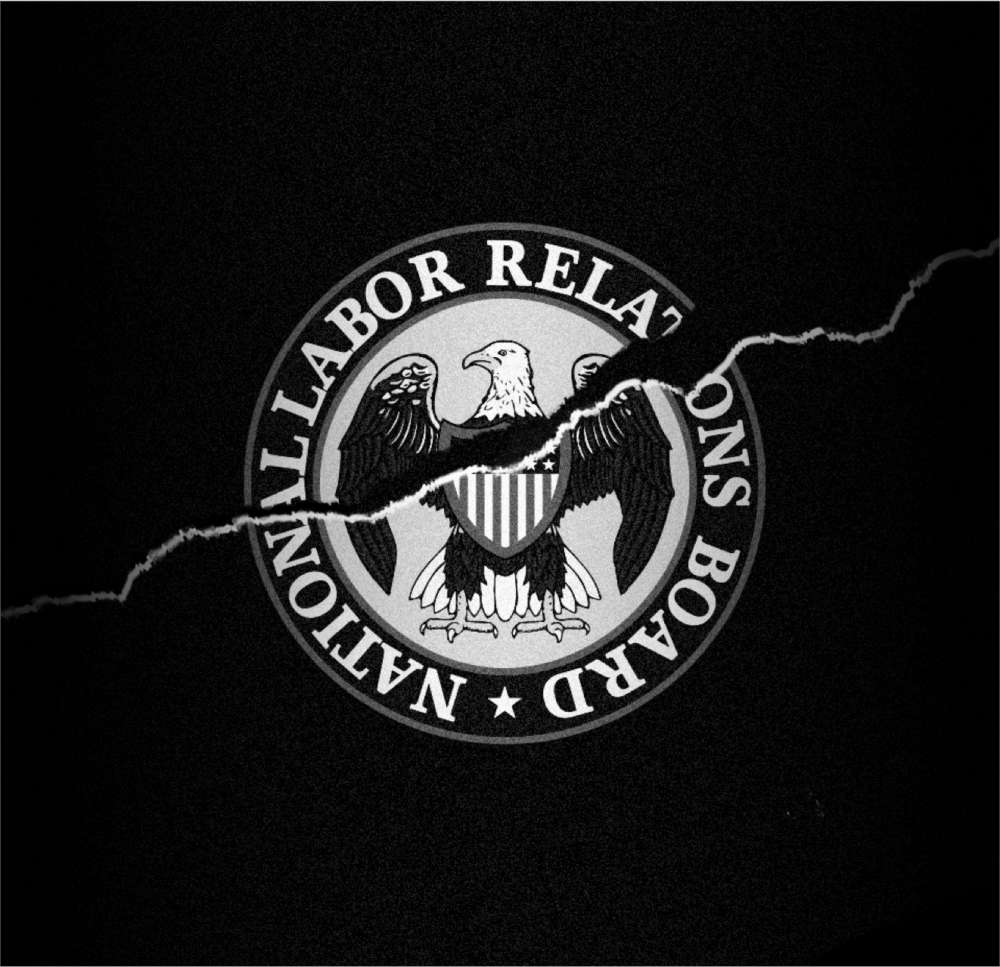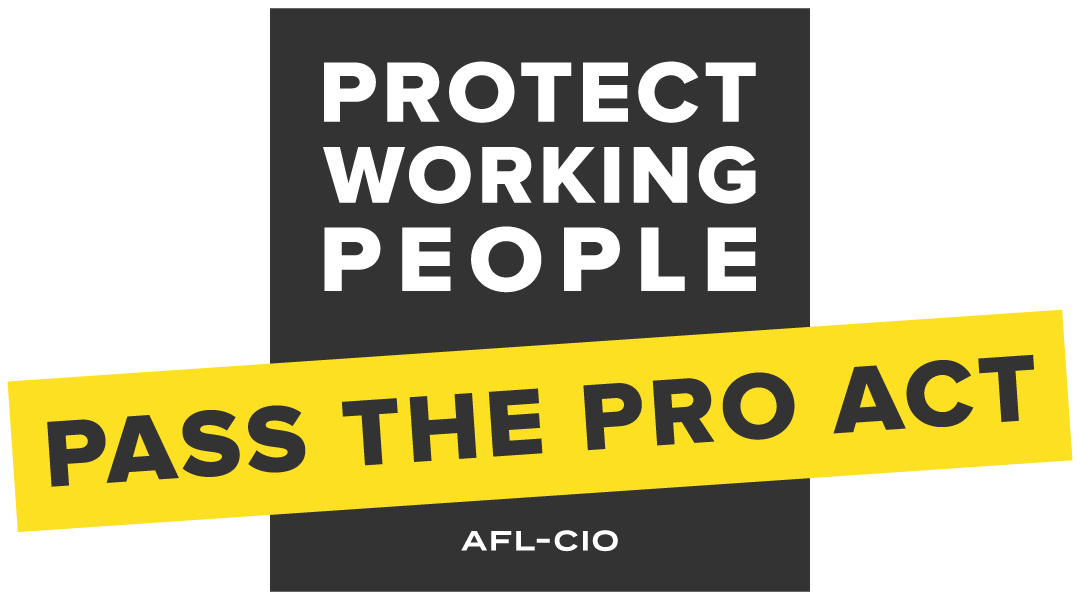Why We Need the PRO Act
Outdated labor laws are not strong enough to protect working people in their workplaces. High-profile corporations openly oppose working people forming unions, without ever facing consequences themselves. Economic inequality has skyrocketed, as working people have been denied a voice on the job and more and more families are falling into poverty.
We need the PRO Act to ensure good jobs for all working people. Historically, unions have turned bad jobs into good jobs in one industry after another. All working people need and deserve the collective power of a union to help achieve decent pay, secure benefits, flexible schedules, fair treatment, and basic respect and dignity at work.
The PRO Act would make it easier for workers who want to form or join a union to do so, and the latest economic research shows that higher union density raises wages, reduces inequality, increases productivity and stimulates economic growth.

Today, in more than 40% of all union organizing elections, employers are charged with breaking the law.
Learn more about the how the PRO Act would affect:
-
The PRO Act will make it easier for workers to stand in solidarity with each other to address labor issues.
The PRO Act amends labor law to make sure workers can exercise our First Amendment rights. Before 1947, it was common for unions to engage in activity—including picketing, strikes and boycotts—directed at companies that could influence the direct employer but were not the direct employer itself. Then, in 1947, Congress passed the Taft–Hartley Act, which prohibited such secondary activity. This ban on secondary activity does not reflect the realities of today’s business structures, which typically include subcontracting and other similar relationships where the company with the power to improve working conditions for workers is not the direct employer. The PRO Act will empower workers by lifting the ban on secondary activity.
Lifting the ban on secondary activity will not disrupt the economy. Most developed countries already allow secondary activity, and none of the nightmare scenarios predicted by corporate opponents of the PRO Act have materialized there. But workers in those countries do tend to have more bargaining power than workers in America. The problem in the United States today is that workers have too little bargaining power, not too much. Lifting the ban on secondary activity is urgently necessary to increase worker voice in a global economy that is very different from what it was in 1947—one in which businesses have come up with all sorts of business strategies to evade any responsibility to the workers who help them create wealth, thereby concentrating wealth in the hands of a few.
-
The PRO Act will not end secret ballot elections or prevent workers’ ability to keep their vote private.
Corporations are pushing misinformation on various aspects of the PRO Act, including the claim that the bill replaces secret ballot elections with card-check (also called “majority sign-up”). The claim that the PRO Act ends secret ballot voting or eliminates voting privacy is false. The PRO Act does not change the way employees choose whether to join a union, nor does it adopt card-check procedures—the common term for certifying a union based on signed union authorization cards rather than a secret ballot election.
Under current law, the NLRB may order that an employer bargain with a union, after an election in which a majority of voters voted against union representation, where the board finds that the employer’s unlawful interference with the election has tainted the electoral environment such that a fair election cannot reasonably be held. The Supreme Court approved this remedy in NLRB v. Gissel Packing Co., 395 U.S. 575 (1969). The board can only issue a “Gissel” order following a full federal hearing on the alleged unlawful conduct, and only if a majority of the eligible voters had signed cards authorizing the union to be the collective bargaining representative prior to the election.
The PRO Act strengthens this remedy by making it the ordinary remedy for employer conduct that interferes with a free election. Under the PRO Act, the NLRB may issue a bargaining order where a union alleges that the employer unfairly interfered with a free election, but only after it has held a hearing and allowed the employer an opportunity to contest the allegations against it. Even then, the board cannot issue a bargaining order under the PRO Act if the employer can show that its violation would not have changed the outcome of the vote. Only where requirements for a bargaining order are satisfied may the board issue an order to bargain, but only if a majority of eligible voters had signed authorization cards within a year prior to the election.
This makes sense: The employer’s unlawful conduct made it impossible for a free election to take place. Thus, in this situation, the NLRB may rely on the only untainted evidence of majority support for the union—the authorization cards—to certify the union.
-
Ensuring that workers can communicate at work electronically—which is the 21st century equivalent of the “water cooler”—is critically important. Employers routinely use company email to broadcast anti-union messages in the workplace while prohibiting workers from communicating over company email in an effort to stamp out union organizing before it starts, even where they allow employees to use email for other nonwork-related communications. The PRO Act will require employers to allow workers to use company email for organizing purposes, unless there are compelling business reasons not to.
The PRO Act Will Not Violate Employee Privacy Rights
Nothing in the PRO Act compromises workers’ private data or subjects workers to unsolicited political outreach. For the past 55 years, when workers came together to form a union, employers were required to turn over a voter list with the names and addresses of employees to make sure workers had access to information both for and against unionization, and the Supreme Court upheld this requirement in 1969.
In 2014, the NLRB issued a regulation to update this voter list requirement to include email addresses and cell phone numbers, and the PRO Act codifies the NLRB’s 2014 regulation. An amendment to H.R. 842, offered by Rep. Sharice Davids (Kan.) and passed by the U.S. House of Representatives, provides that the PRO Act shall not affect the privacy of employees with respect to voter lists provided to labor organizations pursuant to elections directed by the NLRB.
NLRB rules prohibit the use of employee information for any purpose other than the election for which the employer provided the list. Employee information cannot be shared or stored for later use.
Unions have received this information since 2014 during union elections, and there is no evidence that unions have misused the information in that time.
-
The question of joint-employer status is fact-intensive; it depends on the unique facts of each employment relationship. The National Labor Relations Board (NLRB) does not make blanket determinations. Instead, it considers employee and employer status on a case-by-case basis.
However, the PRO Act may well result in the employees of a franchisee being treated also as employees of the franchisor if the franchisor exerts control over the employees’ terms and conditions of employment. But even in that situation, the employees would be considered employees of the franchisor only for purposes of the NLRA and collective bargaining. This means that if workers choose to form or join a union, the franchisor would have a duty to bargain with them. It would still be up to the employees whether they want to organize a union and bargain with their employer or employers.
The PRO Act Will Not End Franchising, Subcontracting and Related Business Structures
Franchising and subcontracting are not going away. What the PRO Act will do is make sure that the businesses that can change workers’ hours, wages and working conditions are actually at the bargaining table. The right to organize and collectively bargain is hardly meaningful if the only people who can actually meet workers’ demands are not even part of the conversation.
For example, recent reports explain that Amazon dictates various aspects of employment for drivers who deliver its packages but does not consider those workers to be its employees. Instead, Amazon claims the drivers are solely employees of the individual small businesses with whom Amazon contracts for package delivery.
Yet through these contracts, Amazon controls important parts of drivers’ jobs, including things like personal grooming and body odor standards, necessary training, drug testing, and the reasons for which workers can be fired. Amazon requires its contractors to maintain “employment at-will” policies, meaning that employees can be fired for no reason at all. Under current law, if these delivery drivers wanted to organize a union and bargain over these policies, they may be unable to do so because the small contracting companies who are considered their sole employers are unable to alter the policies under their contract with Amazon. So unless Amazon is considered a joint employer, the only business that controls those policies will not be at the bargaining table. The workers would be left without anyone to bargain with over these important work issues.
Instead of hiring its own employees, companies engage in this type of contracting out to skirt their responsibilities as employers. The PRO Act ensures this type of employee-avoidance scheme does not render workers powerless in collective bargaining, and that the business that controls the work issue in question is actually at the bargaining table.
